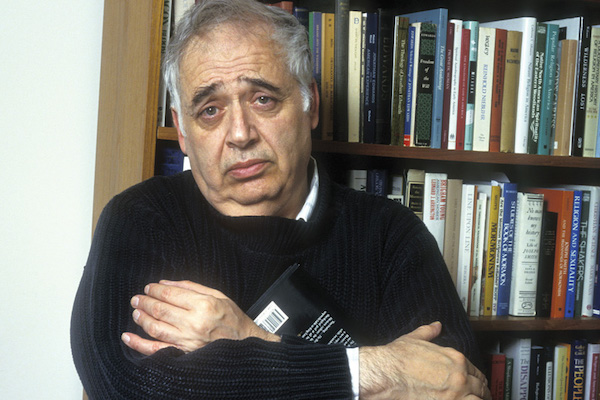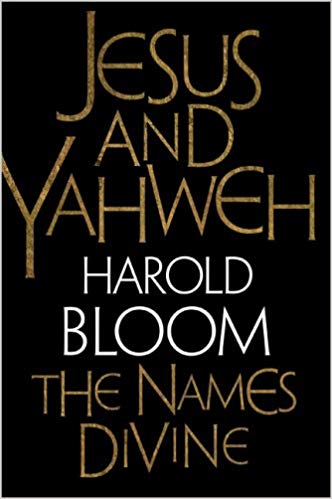Book Interview: The Late Harold Bloom Talks Religion
By Harvey Blume
Literary critic Harold Bloom passed away at the age of 89 two days ago; here’s an illuminating interview with Bloom from 2005.

Harold Bloom — erudite, prolific, and not infrequently melancholy. Photo: Wiki Common.
When I interviewed the late Harold Bloom in 2005 for the Boston Globe I was surprised and pleased to find not a trace of the patronizing and condescending tone that had often marked his public persona. Perhaps the congeniality came from our quickly turning to his Jewish roots, especially the influence the Hebrew Bible, as distinctly opposed to the New Testament, had upon him.
He warmed to this line of inquiry, divulging that his “first contact with the New Testament was in a Yiddish translation” — a detail oddly missing from the NY Times and other obits — and adding, “Now, that I think about it, that Yiddish New Testament was the first book I ever owned.”
That came to be because missionaries, “dropped it off at our apartment in the old East Bronx, when I was 7 or 8.” They were proselytizing Jewish immigrants, such as his parents, who, he said, “never learned to speak or read English.”
The missionaries proposed that the Good News of Jesus would shine forth for them in Yiddish, their mama loshen, mother tongue.
What came of this most peculiar interaction, in the 1930s, in the Bronx, was the seed of an eminent literary critic, one who agreed, when I suggested it, that his notion of the anxiety of influence — the theory upon which he built his career and reputation — had its origins in the tensions involved in overlay of the Christian upon the Hebrew Bible.
I will admit that Bloom’s turning his attention to religious as opposed to purely literary texts attracted me. I’m referring to his Book of J, to start with, about a purported female author of the most energetic and disturbing sections of the Hebrew Bible—those devoted to an uncanny deity known as Yahweh, who is, even in his own terms, beyond good and evil.
Biblical scholars have convincingly discounted Bloom’s version — the female author, Solomon’s court — but it remains engaging, nevertheless.
Bloom’s ability to make literature — religious or not — both awesome and compelling was unique and will be missed.
Erudite, prolific not infrequently melancholy — especially about being nearly 75 — Harold Bloom occupies a unique position in American letters; he is, in effect, our reader laureate. A professor at Yale for five decades, he has tried in dozens of books to teach the country as a whole about literature, assigning reading lists along the way. Reading lists, in fact, are among his specialties: Bloom has labored to define that much-contested reading list known as the Western Canon, and, in the process, has thoroughly assimilated vast chunks of it.
Bloom made his name as a critic in 1973 with The Anxiety of Influence, in which he proposed that great poetry has always depended on a lot of reading—or, more precisely, on a lot of misreading. Any good poet, he claimed, had to engage in ”deliberate misinterpretation…of a precursor poem or of poetry in general.”
 In Bloom, great writers commune and contend with each other, as, in his view, they do in the canon. Don’t be surprised, therefore, to find in Jesus and Yahweh: The Names Divine (Riverhead), Bloom’s new book, that Saint Mark reminds him of Edgar Allan Poe, or that Freud crops up in connection to the Book of Daniel. And because Bloom has long since pronounced Shakespeare our greatest writer, for him there’s nothing peculiar about bringing Hamlet and Lear into discussions of Jesus and Yahweh, as the god of the Hebrew Bible is sometimes known.
In Bloom, great writers commune and contend with each other, as, in his view, they do in the canon. Don’t be surprised, therefore, to find in Jesus and Yahweh: The Names Divine (Riverhead), Bloom’s new book, that Saint Mark reminds him of Edgar Allan Poe, or that Freud crops up in connection to the Book of Daniel. And because Bloom has long since pronounced Shakespeare our greatest writer, for him there’s nothing peculiar about bringing Hamlet and Lear into discussions of Jesus and Yahweh, as the god of the Hebrew Bible is sometimes known.
In recent years, Bloom has often turned his attention to religious texts. In The Book Of J (1990), for example, he focused on that strata of the Old Testament that scholars attribute to the ”J” writer or Yahwist. In his new book, Bloom confesses that ”my Orthodox Judaic childhood lingers in me as an awe of Yahweh.” The new book also shows how much Bloom’s theory of literary influence owes to his sense of the New Testament’s relationship to the Hebrew Bible. In examining that relationship, Bloom leaves no doubt that on literary, cultural, and even political grounds, he remains devoted to the older text.
Blume: Isn’t it odd that your first contact with the New Testament was in a Yiddish translation?
Bloom: Yes, fascinating. Missionaries dropped it off at our apartment in the old East Bronx, when I was 7 or 8. Yiddish is my mama loshen [mother tongue]. Neither my father or mother ever learned to speak or read English. Now that I think about it, that Yiddish New Testament was the first book I ever owned.
Blume: Despite your academic credentials, you are an autodidact, yes?
Bloom: I am. I owe my entire education to the New York Public Library. I read my way through the Bronx Public Library and, when I was 15, took the subway for the first time, down to the 42d Street Library. I went there every day after school, intending to read my way through the place.
Blume: Do you do your own translation of Hebrew Scripture?
Bloom: Yes. At one point I contemplated becoming a scholar of Hebrew letters but found my ferocious love of English and American poetry was too great.
Blume: Would it be a misreading to say that your theory of the anxiety of influence in literature begins with your ideas about the relationship between Christian and Jewish Scripture?
Bloom: It would not be a misreading at all. I began brooding about the anxiety of influence well before I came up with the phrase—probably in a course I took, back when I was 18 or 19, about the New Testament and the Hebrew Bible.
I think the Greek New Testament is the strongest and most successful misreading of a great prior text in the entire history of influence. Everything in the New Testament is deliberately lined up so as to serve—so they say—as the ultimate fulfillment of the Hebrew Bible. But, historically speaking, I do not think the treatment Jews have received from Christians is any kind of fulfillment. Rather it’s an endless—I must fall back on the Yiddish here—shandah [shame].
Blume: You identify yourself as a Gnostic Jew. Meaning what?
Bloom: A heretical Jew. I’m a sort of Emersonian Gnostic. I believe, as Emerson did, in the god within—that there is loaded within the rock of ourselves that oldest and best part of us, which in some curious sense is divine.
Blume: When you say Yahweh is your favorite literary character, does that mean, to your mind, that Yahweh is only a literary character?
Bloom: There is such metaphysical density, such power, so much sense of human reality in Falstaff, Lear, Hamlet, Mark’s Jesus, and, most of all, the Yahweh of the Yahwist or J writer of the Hebrew Bible, that they are at least as real as you are, no matter who you are.
Blume: It strikes me that Jesus and Yahweh is a 21st-century religious polemic, against Christianity and for Judaism.
Bloom: That is not an unfair description. I did not set out to do that, but I suppose that’s me, and I couldn’t keep it out. When Christianity became the official religion of Rome, it fused with Roman power, which had been used to scourge and destroy us, including presumably the historical Jesus. Jesus lived and died with Yahweh. He was no Christian, which is something that Christians can’t seem to get through their heads. He was a better Jew than I am, let me put it that way.
Blume: There’s a touch of ruefulness in the new book. You quote the Talmudic sage Hillel: ”Be not sure of yourself until the day of your death, and judge not your fellow until you come into his place.” Then you say: ”Perhaps I myself need to reflect more on that than I tend to.”
Bloom: I’m 75. I had a terrible health crisis three and a half years ago. It started with a sudden bleeding ulcer, and ended with a three-way open heart bypass. It took me six months to recover. It made me more thoughtful.
Blume: One feature of the new book is that you go back and forth between religious and secular writing all the time. Do you read Scripture and, say, poetry in the same way?
Bloom: Every distinction that people make between what they call sacred literature and what they call secular literature is, in the end, really a political distinction. There’s only great writing, good writing, and bad writing. I do not read the Tanakh [Five Books of Moses] or the New Testament at its best—and it’s not always at its best—any differently than I read Shakespeare.
Blume: Do you think many people read that way?
Bloom: No. I don’t think I’ve persuaded very many.
Harvey Blume is an author—Ota Benga: The Pygmy At The Zoo—who has published essays, reviews, and interviews widely, in The New York Times, Boston Globe, Agni, The American Prospect, and The Forward, among other venues. His blog in progress, which will archive that material and be a platform for new, is here. He contributes regularly to The Arts Fuse, and wants to help it continue to grow into a critical voice to be reckoned with.
